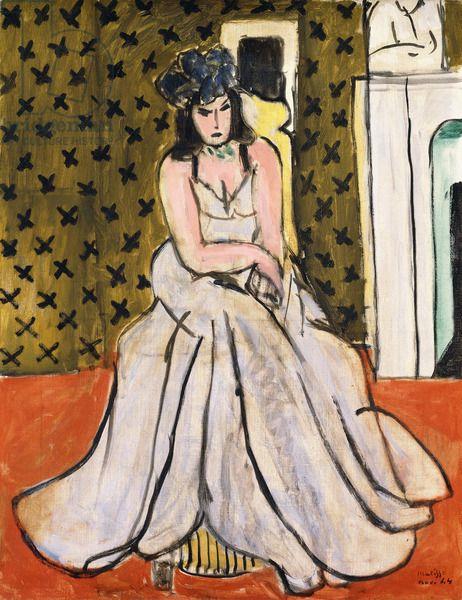Description
Henri Matisse, one of the most distinguished painters of the 20th century, offers us in "Woman with a Blue Hat" a work that encapsulates the essence of his mastery of color and form. Created in 1944, this piece reflects the evolution of his style during his later years and his experimentation with the use of color as a primary expressive force.
The first thing that captures attention is, undoubtedly, the vibrant use of blue in the woman's hat, which becomes the central and titular element of the composition. This hat not only serves as a focal point but also establishes a striking contrast with the other colors in the work, especially with the tones of the skin and the clothing of the female figure. The choice of such a deep and pure blue could be interpreted as a symbol of serenity and reflection, both feelings frequently associated with Matisse's late work.
The female figure is portrayed with an elegant simplicity, characteristic of Matisse's style. Her face is executed with soft and clean lines, and the details are reduced to the essential minimum, allowing the woman's expression and posture to emerge with clarity. The dark eyes and red mouth add a touch of life, almost as if the woman were captured in a moment of introspection. The schematic nature of the portrait suggests the influence of Fauvism, a movement of which Matisse was one of the founders and which is characterized by the intense and non-naturalistic use of color.
As for the composition, Matisse displays his mastery by balancing the figure with a simplified and geometric background. The straight lines and blocks of color in the background act as a counterbalance, framing the woman without distracting attention from her profile and expression. The subtle interaction between the background and the figure contributes to the dynamism of the painting, highlighting the artist's ability to create depth and dimension through the careful juxtaposition of shapes and colors.
The year of creation of the work, 1944, is significant in itself. In the midst of World War II, Matisse was in a stage of introspection and artistic renewal. His residence in Nice, despite the wartime turmoil that ravaged Europe, became a refuge of creative peace where the artist could continue exploring his art with renewed passion. The tranquility of his surroundings is reflected in "Woman with a Blue Hat", where calm and contemplation seem to permeate every stroke.
It is interesting to note that Matisse, through this work, continues his exploration of the female theme, omnipresent in his career. The women in his paintings are often representations of beauty, mystery, and sensuality, and "Woman with a Blue Hat" is no exception. The model, whose specific identity is not known, becomes a vehicle for Matisse's aesthetic concerns rather than a personal portrait.
The painting bears a close stylistic relationship with other works by Matisse from the same period, such as "The Romanian Blouse" and "Annelies, White Tulips and Anemones". In all of them, a simplification of forms and a predominance of color can be perceived, which defined his artistic production after his adoption of paper cutouts as his main technique. Although "Woman with a Blue Hat" remains a painted work, the influence of this technique is evident in the way Matisse approaches forms and colors.
In conclusion, "Woman with a Blue Hat" is a brilliant representation of Henri Matisse's artistic genius. In this piece, we see a synthesis of his explorations with color, form, and simplicity that culminate in a work that is both introspective and exuberant. It is a testament to how, through personal and global challenges, Matisse managed to create art that continues to resonate with freshness and vitality today.

